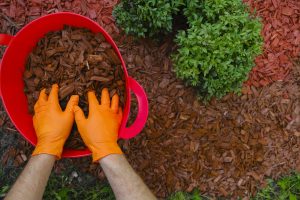6 Ways Mulch Is Good for Your Gardens

Whether you’re tending to flower beds or vegetable gardens, mulch is your friend. When done properly, mulching helps you save time on landscape maintenance by cutting down the need for watering, weeding, and pest control. Not only does this save you precious time, but it also lends nicely to overall healthier flowers, veggies, and fruits. So, if you haven’t already put this powerful product to use, read on to learn about the types of mulch and the several ways in which mulch is good for your garden.
What Is Mulch?
Before diving into its types and advantages, let’s rewind to the basics: What is mulch? Essentially, mulch is any material that’s spread or laid over the surface of soil and used as a covering.
Different Types of Mulch
Mulch doesn’t come in just one shape or size. In fact, mulch comes in a variety of materials, colors, and textures. But all types of mulch fall into one of two categories: organic or inorganic.
- Organic mulches are all natural; they consist of formerly living material like grass clippings, chopped leaves, wood chips, straw, shredded bark, and compost.
- Inorganic mulches are those made from synthetic materials, like plastic and landscape fabrics, or stone and gravel.
For the purposes of this blog, we’ll focus only on organic mulches. Both organic and inorganic mulches are beneficial, but the organic ones also add value to the soil as they decompose.
Top 6 Things Mulch Is Good For
Regardless of the type you choose to use, all organic mulch is good for your garden in these ways:
- Keeping Plants Cool/Warm – Mulch is the ultimate temperature regulator. In the summer, it acts as a barrier against the hot and drying sun during the day, while acting as a warm blanket during the cooler nights. In the winter, mulch protects against harsh conditions like freezing temperatures, thaws, and strong winds.
- Retaining Soil Moisture – By shielding the soil’s surface from sun, mulch reduces water loss or evaporation. And since the soil stays moist longer, you don’t have to water as frequently.
- Preventing Weeds – Mulch helps prevent weeds and other unwanted growths (like fungus) by blocking seeds and spores from landing on fertile ground. It’s also more difficult for weeds to grow without sunlight; mulch keeps the soil’s surface in the dark.
- Providing Nutrients – As organic mulch decomposes, the soil beneath absorbs its nutrients, thereby improving overall soil quality and promoting plant health.
- Reducing Soil Erosion – When not covered by mulch, a soil’s surface can crust. This makes it harder for the soil to accept water and can cause runoff.
- Adding Visual Appeal to Your Landscape – Of course, the functionality of mulch is really what makes it so attractive to property owners everywhere. However, it doesn’t hurt that mulch creates an aesthetically pleasing and uniform look to your gardens, too!
Now that you know all the ways in which mulch is good for your garden, it’s time to get to mulching! If you need a hand spreading mulch, planting garden beds, or with any other landscape maintenance task, give us a call. Here at Evolve Landscaping, we have more than 20 years of experience in providing professional landscaping and masonry services to residents and businesses across Worcester County; we’d love to give you a free estimate!